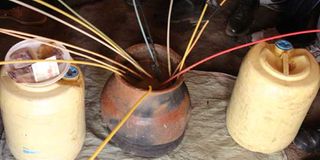Study: Traditional brews are contaminated with aflatoxin

Traditional brews made from grains such as maize (busaa) and sorghum, are contaminated with aflatoxin, a toxic fungi which increases the risk of cancers of the liver and the digestive system, a new study has shown. PHOTO | FILE
What you need to know:
- The study titled Contamination in unrecorded beers from Kenya—A health risk beyond ethanol, showed that the prevalence of aflatoxins in brews was highest in Kibra in Nairobi, where three out of six samples of maize opaque beers tested were contaminated.
- Beers contaminated with aflatoxin were also found in Bungoma, Samburu and Taita Taveta counties. Such brews are made from fermented maize, sorghum or malted millet and water, with maize being the preferred grain owing to its wide use and availability as a staple food.
- The aflatoxin contamination prevalence of maize in Kenya ranges from 16 to 65 per cent, while consumption is estimated at 0.3 kg per person per day. The International Agency for Research on Cancer classifies aflatoxin in the highest category of carcinogens.
Traditional brews made from grains such as maize (busaa) and sorghum, are contaminated with aflatoxin, a toxic fungi which increases the risk of cancers of the liver and the digestive system, a new study has shown.
The study titled Contamination in unrecorded beers from Kenya—A health risk beyond ethanol, showed that the prevalence of aflatoxins in brews was highest in Kibra in Nairobi, where three out of six samples of maize opaque beers tested were contaminated.
Beers contaminated with aflatoxin were also found in Bungoma, Samburu and Taita Taveta counties. Such brews are made from fermented maize, sorghum or malted millet and water, with maize being the preferred grain owing to its wide use and availability as a staple food. The World Health Organisation estimates that globally, unrecorded (illegal and unregistered) alcoholic drinks account for 58 per cent of total adult alcohol consumption.
As it is, ethanol is known to pose a higher risk of cancer than aflatoxin, thus in combination with the toxic fungi in traditional brews, this risk is heightened.
Fifty-eight samples of unrecorded beers were tested by scholars from the University of Nairobi, Germany and Canada. Eight registered wines from retail outlets in Nairobi were also tested, but found not to have aflatoxins.
“Aflatoxins are an unknown risk to consumers. Producers should be educated on measures to reduce aflatoxins in alcoholic beverages,” Alex Okaru, one of the researchers, told HealthyNation.
CHRONIC EXPOSURE
The aflatoxin contamination prevalence of maize in Kenya ranges from 16 to 65 per cent, while consumption is estimated at 0.3 kg per person per day. The International Agency for Research on Cancer classifies aflatoxin in the highest category of carcinogens.
Further, a joint Food and Agriculture Organisation and the World Health Organisation Expert Committee on Food Additives recommends that aflatoxin exposure in diets be reduced as “an important public health goal.”
Dr Okaru warns that chronic exposure to low doses of aflatoxins is “an established risk factor for liver cancer and at higher doses may also interfere with immunity and is thus risky for people with depressed immunities such as those with HIV or cancer.”
The research adds that apart from Bungoma, which records good maize harvests, Samburu and Taita “are known to suffer grain shortages and thus are more susceptible to using grains with mould for brewing, sparing the non-contaminated ones for food.” This is particularly important because seasonal maize shortages may exert more pressure on brewers of home-made drinks to use unsuitable grains.
Samples of alcoholic brews from Kisii, Narok, Bomet, Kericho, Kisumu, Busia, Migori, Nakuru, Elgeyo Marakwet Uasin Gishu and Kakamega did not have aflatoxins. The study noted that this could be “due to the use of non-moulded grains, limited sampling and/or because the brewing processes lower aflatoxin levels.” Apart from grains, traditional brews are also made from coconut palm, cashew nuts, sugar cane and the sap of plants such as Kigelia Africana (sausage tree). Among the sampled counties, brews not made from grains were found in Embu, Kiambu, Nyeri and Kirinyaga and they did not have aflatoxin.
****
Symptoms of aflatoxin poisoning
Vomiting, abdominal pain, pulmonary or cerebral oedema, necrosis (death of cells), fatty liver, anorexia, depression, jaundice, diarrhoea and photosensitivity.



